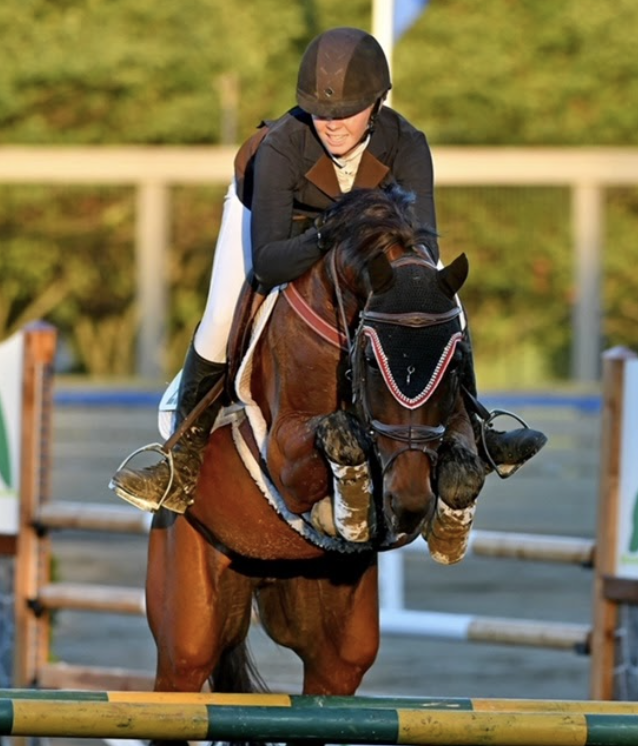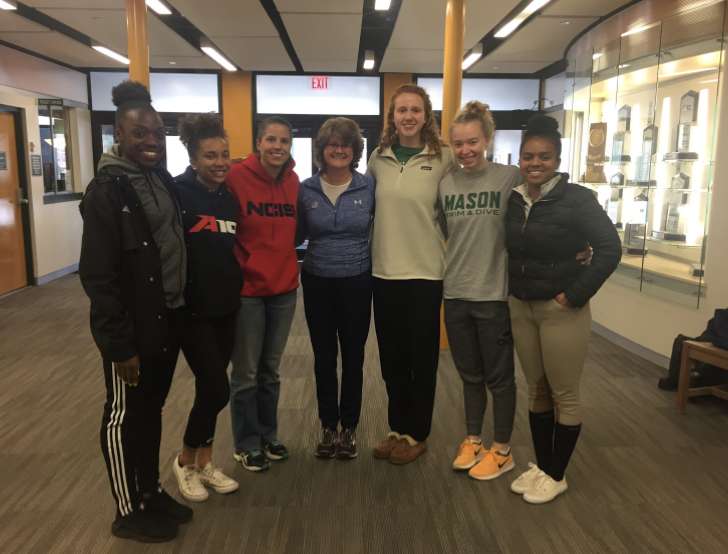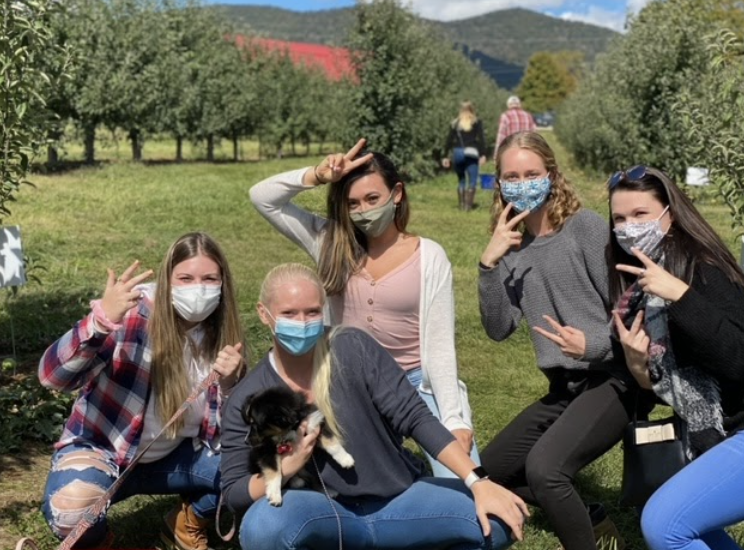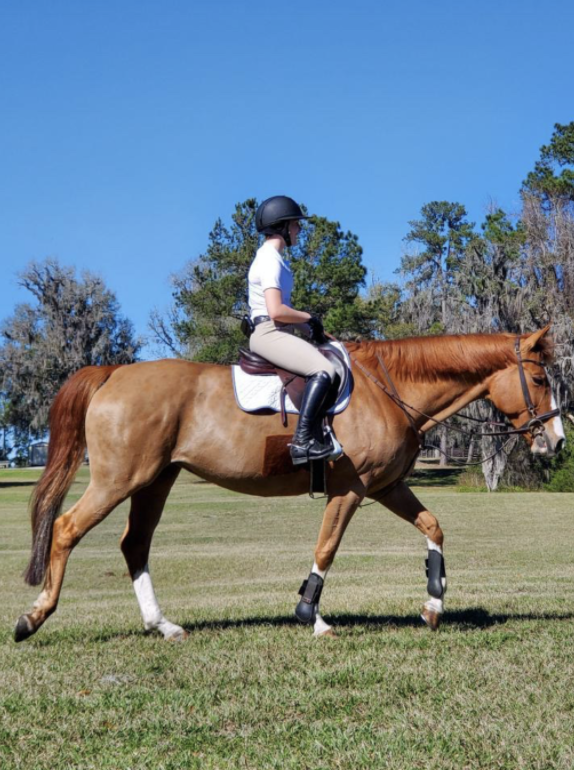In the previous article, college equestrians were interviewed about how they’ve found a balance between their academic and equestrian lives. In this article, equestrians that have found a different college/riding balance, one without horses, share their experience.
Sydney Moriarty is a 20 year-old senior at Virginia Tech majoring in Clinical Neuroscience. She is currently applying to graduate schools to make her way into doing research or practicing medicine. She does not have a horse at school with her, and recently sold her horse, but tries to ride every chance she gets.
Malachi Hinton is a 23 year-old professional show jumper based in Toano, Virginia. Recently, Malachi graduated from George Mason University with a bachelor’s degree in Community Health and with a concentration in Clinical Sciences. This year she acquired a promising 6-year-old jumper, began ShowAssist, and is exercise riding and catch riding.
Corinne Davies is from New Jersey and is a freshman at the University of Kentucky majoring in English. She did not bring her horse to school with her during the fall semester of her freshman year, but has decided to bring her horse back to school with her for this spring semester.
How did you decide to attend school without your horse?
Sydney and Malachi began their college careers with a horse, but later decided to focus on school.
Sydney’s horse provided an “outlet to get away from studying.” However, after the horse sold the winter after her first semester, she picked up a heavy spring course load. Realizing that she would likely not have enough time to commit to her horse, she decided to focus on school. Sydney says “It was hard feeling like I had to choose between horses and school, but ultimately my goals were not aligning with the horses anymore, so I felt like I could always go back later on and ride to enjoy it versus riding as a career.”

Sydney Moriarty realized that while horses might not be her focus now, she could go back later.
Photo by Alex Thomas.
Malachi also did a mixture of both. During her freshman and part of her sophomore years, she had her junior horse, F-15 (Cadet), with her at school and continued actively showing while Cadet was listed for sale. After he sold, Malachi continued to ride as much as possible, stating “Even once my horse sold, I tried to ride as much as possible. I contacted local barns and owners about looking for saddle time and hopped on any horse I could.”
Corinne, on the other hand, started her college experience without her horse. “I originally decided to attend school without my horse because I wanted to take a break from riding and give myself a chance to settle into college without the responsibilities that come with riding. I also wanted to give myself a chance to find a new hobby or sport that I enjoyed to fill the time that riding used to fill for me.” However, midway through her first semester at college, she realized that riding is something she needed back in her life. “Especially with the pandemic right now, I wasn’t as busy with school as I thought I was going to be. I found myself with a lot of downtime in my dorm with nothing to do, which left a lot of room for missing my horse and the entire sport.” With that, Corinne is excited to have her horse join her for the upcoming spring semester!
In what ways did you get involved in school activities?
Sydney has found new opportunities, many of which supplement her studies, that have guided her experience in college. “A lot of the activities I became involved with revolved around academics… I started working with Virginia Tech’s helmet lab on the Equestrian STAR Rating project. I also spent some time in a Neuroscience research lab—both of these opportunities heavily influenced my desire to go to graduate school.”
Malachi’s experience with extracurriculars helped her “experience and appreciate different cultures and meet new people.” Taking advantage of new opportunities helped her “[become] a student leader in student organizations such as the Fellowship of Christian Athletes and the Multicultural Association of Pre-Health Students.” She also explained how she “stepped out of my comfort zone and participated in dance classes with the Caribbean Student Association.” Malachi appreciated the diversity of opportunity, explaining that “Even though many of these activities were not equestrian related, they truly opened my eyes to the many communities of the world and taught me valuable lessons that I believe helped me to become a more well-rounded and thoughtful person.”

Malachi Hinton found ways to balance new interests during her time in college.
Picture from Malachi Hinton.
What is one piece of advice you have for someone attending school without a horse?
If you aren’t able to bring your horse or continue riding, or you decide that you need some time off, that’s okay! Sydney, Malachi, and Corinne all have experienced many wonderful opportunities in school, and encourage others to explore new options as well.
Malachi encourages students to “enjoy the many great experiences that you can have at school. It is a wonderful place to meet new people, learn about different communities, explore different careers, and to enjoy where you are in life.” While it was sometimes challenging for her to take a bit of a pause from a riding career, her experience in school reminded her of why she rides.
It’s important to recognize that opportunities with horses won’t disappear, even if you take a break. Sydney encourages everyone to “remember [taking a break] doesn’t make you any less of a horse person. We have to prioritize things as we go through life, and if horses are put on hold for a few years, it will be okay. You can always go back. The most important thing is doing what makes you happy and finding outlets outside of studying 24/7.”

Finding activities to help balance school and life.
Photo from Sydney Moriarty.
Not having her horse for her first semester allowed Corinne to do just that – find new outlets.“My advice for people attending school without a horse is to start going to the gym. You might find something that keeps you fit and clears your mind just as much as riding does. If the gym doesn’t help, try to find other activities that will clear your mind and keep you in good shape. That was the biggest challenge for me when I was getting used to college and not riding.”
Finding ways to stay happy, relaxed, and active (in and out of the saddle) is a great self-care technique!
Photo from Corinne Davies
While everyone’s situation is different, and will require finding a balance and approach ideal for them, I hope this ‘Balancing College’ series was useful to you. Thank you again to all of the students that shared their experiences with us. Best of luck this semester!

